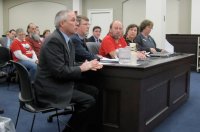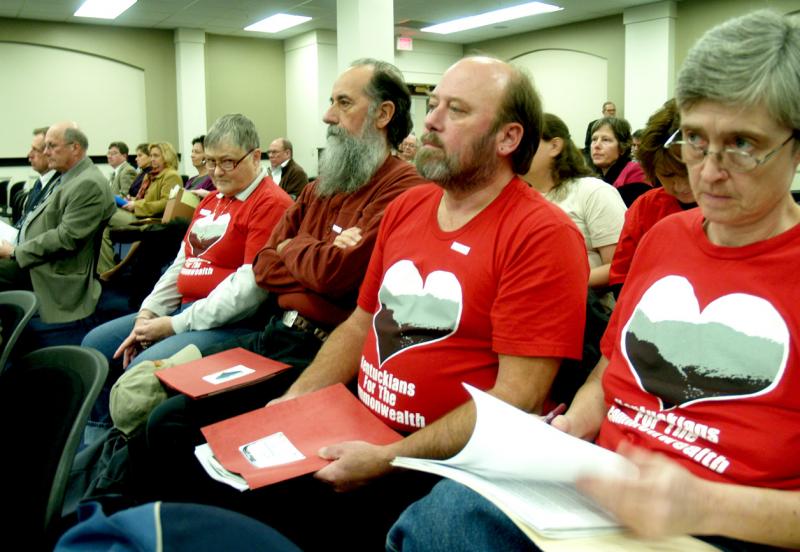Strong testimony helps delay bad selenium rule

A legislative subcommittee today took action to defer for at least 30 days approval of a weakened water quality standard for selenium.
That was a victory for Kentucky residents who made that request to the Administrative Regulation Review Subcommittee at a hearing Monday afternoon.
“We ask that you use your oversight authority to extend the comment period to the usual 30 days, so we may analyze the shoddy science these regulations are based on, and to give those of us who live near selenium-contaminated streams an opportunity to voice our concerns,” KFTC member Bev May said to committee members.
May told them that she lives along Wilson Creek in Floyd County, a stream that remains contaminated with selenium today even though the strip mining at the head of the hollow occurred about 20 years ago.
She reminded them that a 2009 Kentucky Division of Water study “found extensive selenium contamination, sometimes at highly toxic levels, below mountaintop removal and valley fills.” However, the state delayed release of these findings so that it would not have to require coal companies to monitor their selenium pollution as a condition of their water pollution permits.
At iss ue is a proposal by that same Division of Water to weaken an already insufficient standard for protecting the public from selenium exposure. The new standard would change both the level of acceptable selenium concentration in water and the methodology to one that looks at concentration in fish tissue and ovary eggs.
ue is a proposal by that same Division of Water to weaken an already insufficient standard for protecting the public from selenium exposure. The new standard would change both the level of acceptable selenium concentration in water and the methodology to one that looks at concentration in fish tissue and ovary eggs.
“By the time to you get to this [new] criterion there won’t be any ovaries to look at,” KFTC member Ted Withrow testified. He added that the methodology is “backed up with old science that was discredited years ago. The science is overwhelmingly flawed to be put forth in a rushed way.”
Selenium is a bio-toxin that accumulates in fish tissue. So even small exposures can have devastating long-term health impacts.
The lack of proper public notice was also at issue in today’s hearing and mentioned by Lane Boldman of the Sierra Club, Art Williams of the Kentucky Conservation Committee and Tom FitzGerald of the Kentucky Resources Council, who also spoke at the hearing in opposition to the new regulation.
“I am deeply concerned as a matter of process,” said FitzGerald, who said the state’s proposal was made at the “eleventh hour with no notice and no opportunity for comment. It feels like a bait-and-switch situation.”
The state did give notice last year that it was contemplating changes in the selenium standard. It received public comments and took those into consideration, said Bruce Scott, commissioner of the Kentucky Department for Environmental Protection.
But the amended proposal that was made public on February 5 was “a dramatically different proposal than what they asked comment on,” pointed out FitzGerald. It was not a change that the public would have known was being considered based on the public notice issued last fall.
The Administrative Regulation Review Subcommittee does not have the authority to veto regulations proposed by state agencies. But it may suggest changes or that adoption be deferred.
In a debrief after the hearing, Doug Doerrfeld pointed out that the testimony from KFTC and allies “was extremely well-balanced and effective. The preponderance of it brought them over to our side.”
Recent News
Kentucky’s past legislative session showed alarming trend toward government secrecy
Churchill Downs takes more than it gives. That's why the Kentucky Derby is a no-go for me
‘We must never forget.’ Kentucky town installs markers for lynching victims.
Featured Posts
Protecting the Earth
TJC Rolling Out The Vote Tour – a KFTC Reflection Essay
KFTC Voter Empowerment Contractor Reflection Essay
Archives
- Home
- |
- Sitemap
- |
- Get Involved
- |
- Privacy Policy
- |
- Press
- |
- About
- |
- Bill Tracker
- |
- Contact
- |
- Links
- |
- RSS


Add new comment